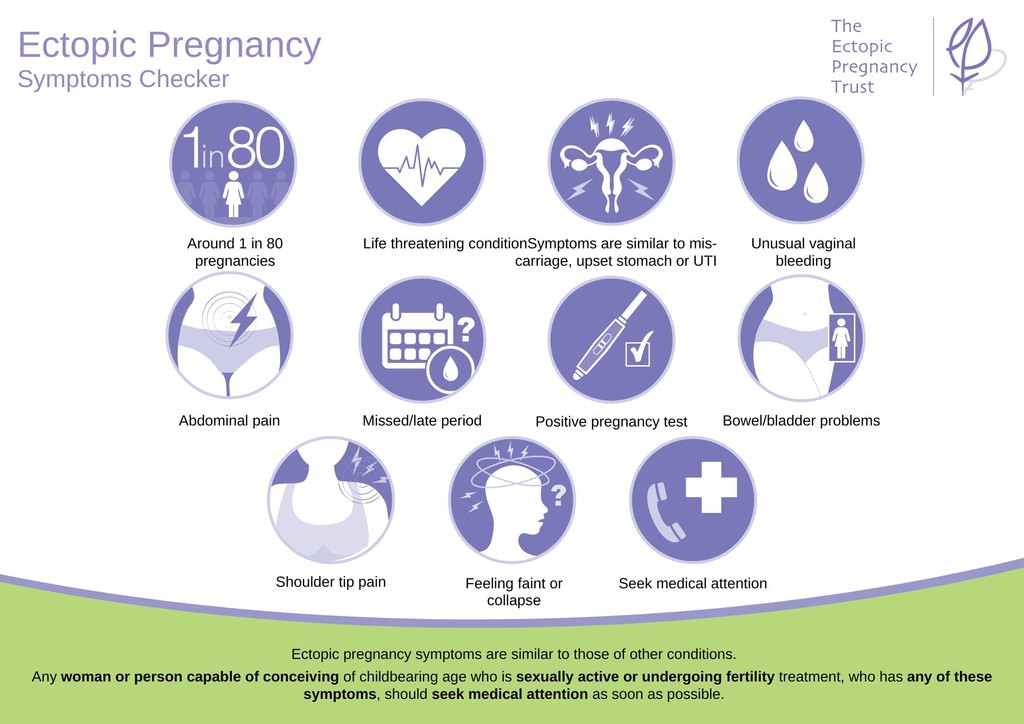Symptoms of an Ectopic Pregnancy
Lower tummy/abdominal pain and/or bleeding during pregnancy may be due to a number of causes. It is however very important that an ectopic pregnancy as the cause is excluded. If not diagnosed and treated quickly an ectopic pregnancy can lead to internal bleeding and a medical emergency.
Some experience symptoms that are similar to other conditions such as gastroenteritis (tummy bug), urinary tract infection (UTI), pelvic inflammatory disease (PID) and miscarriage, which are the most common ways to misdiagnose an ectopic pregnancy. Not all experience symptoms.
When ectopic pregnancy symptoms start
The diagnosis of ectopic pregnancy may sometimes be difficult, and symptoms may occur from as early as 4 weeks pregnant and up to 12 weeks or even later. In addition, although there are a number of recognised risk factors, in over 50% of women diagnosed with an ectopic pregnancy, there are no identifiable risk factors. See the reasons for an ectopic pregnancy page for more information.
If your instincts are screaming at you that something does not feel right, it is OK to trust them and ask for reassessment at any time. Please do be vigilant and take any pain that concerns you seriously until absolutely proven otherwise.
If you are experiencing any of the following ectopic pregnancy symptoms, please contact your doctor/GP or your local Early Pregnancy Unit. You can also call the NHS Direct 111 service by dialling 111 or access the NHS GP at Hand service. You can contact your out-of-hours doctor/GP service if your normal surgery is closed or go to your local Accident and Emergency department (A&E) or Urgent Care Centre.
You can also view all the options for gaining professional help here.
Detailed general information can be found here on our website. Please remember that online medical information is no substitute for expert medical care from your own healthcare team.

A missed or late period
If you have missed one or more periods, the most likely reason is that you have become pregnant, and it is progressing as it should. However, if you experience typical pregnancy symptoms, such as nausea, painful breasts or a swollen abdomen but no bleeding or pain, this does not completely rule out an ectopic pregnancy, although this is rare. A true period should be normal flow and duration for you. A light period may be abnormal bleeding in pregnancy and should be investigated with a pregnancy test.

Vaginal bleeding
Ongoing bleeding that is sometimes red or brown/black and watery (like “prune juice”) should be investigated. The bleeding may be heavier or lighter than usual. Prolonged off/on light and sometimes heavy bleeding are quite often seen in ectopic pregnancy and should always prompt a pregnancy test and if positive should be urgently investigated with an Early Pregnancy Unit (EPU) referral.
When seeking medical attention, you will be asked for your last menstrual period which should be your last episode of a normal flow and duration bleeding. It is important that abnormal bleeding does not get confused with a normal period as healthcare professionals may think you are much less pregnant than you are.

Pregnancy test
Pregnancy test kits that are available now are very sensitive. They can be positive before you have missed your period. It is sensible to perform the test in the morning when urine contains the most pregnancy hormone (Human Chorionic Gonadotropin or hCG). Very rarely a pregnancy test can give a falsely negative result. This is usually because the hormone level is low. If you do a pregnancy test and are surprised by a negative result, repeat the test perhaps with a different pregnancy test kit. If it is still negative and you still think you are pregnant, your doctor can do a blood test to measure the hCG (pregnancy hormone) levels accurately.
If you are in pain and/or bleeding and your home pregnancy test is negative, but you think it should be positive, ensure you are seen by a doctor urgently by attending your local Accident & Emergency department or by contacting your specialist Early Pregnancy Unit.
The blood test that doctors would perform is for hCG which is a hormone produced in pregnancy. HCG is commonly detected in urine by using a urinary pregnancy test, which can show as positive or negative. Blood tests can identify the exact hCG level in the blood. Your GP can do this test, but it will take a few days to get the result, while the hospital and EPU will have the result in a few hours. This is why, if you have symptoms and a surprisingly negative urine pregnancy test, it is better to be seen at the hospital.

Abdominal pain
During pregnancy, it is not uncommon to experience a period-like ache in your lower tummy and back. However, the following should be investigated:
- One-sided pain in your tummy which may be persistent (which means it continues) or intermittent (which means it comes and goes). The pain may have begun suddenly or been gradual.
- Discomfort with bloating and a feeling of fullness (not associated with eating) when lying down, particularly if you have already had a child.
- Significant lower abdominal and/or back pain.

Shoulder tip pain
Shoulder tip pain is exactly where it says – not the neck or the back but the tip of your shoulder. If you look to the left over your shoulder and then cast your eyes down, the tip of your shoulder is where your shoulder ends and your arm starts. Shoulder tip pain is very distinctive. You know when you have it because it is a very weird pain you have probably never experienced before. The pain may have begun suddenly.
Shoulders cause pain when we are stressed because we hold ourselves more rigidly and muscles in the back and neck go in to spasm or you may have slept in an awkward position – this is most likely not shoulder tip pain related to an ectopic pregnancy.
Shoulder tip pain tends to develop with other symptoms such as feeling unwell, abdominal pain or vaginal bleeding, faintness, abdominal bloating and fullness, or pain when opening your bowels (poo).
It is caused by internal bleeding irritating the diaphragm (the muscle in your chest which helps you to breathe) when you breathe in and out.

Bladder or bowel problems
- Diarrhoea
- Pain when you have your bowels open (go for a poo)
- Pain when you pass water (have a wee)
- Shooting/sharp vaginal pain
Some pain and a change in your normal bladder and bowel pattern are features of a typical pregnancy for some. All the same, if you present at your doctor/GP or Early Pregnancy Unit with such symptoms, it would be reasonable to have an early pregnancy assessment.

Collapse
- Feeling light-headed, or faint, or actually fainting
- Often accompanied by sickness and looking pale
- Increasing or slowing pulse rate or falling blood pressure may also be present
What does ectopic pregnancy pain feel like?
Ectopic pregnancy pain can be on one side of the tummy, or lower abdomen, or in the pelvic area. Experiencing these pains during early pregnancy may mean that you could be experiencing ectopic pregnancy. Consult an emergency healthcare professional immediately.
What are the chances of a woman or pregnant person having an ectopic pregnancy?
The risk of ectopic pregnancy is not uncommon – around 1 in 80 pregnancies are ectopic. This is when the fertilised egg implants itself outside of the womb, most commonly in a Fallopian tube, but other sites can be on an ovary, within a Caesarean section scar, or in the cervix.
Deciding whether your symptoms are getting worse
It can be difficult to know which symptoms are concerning. Are they symptoms of an ectopic pregnancy or normal pregnancy sensations? If you are at worried, you should seek medical advice. Contact your doctor/GP or local Early Pregnancy Unit for advice. Your GP will likely refer you to your local Early Pregnancy Unit for an assessment by a healthcare professional. This may involve a blood test to check hormone levels and/or an ultrasound scan depending on how many weeks pregnant you are and your symptoms.
It is important to remember that normal pregnancy symptoms are common and that not everyone experiencing such symptoms will have an ectopic pregnancy. It could still be a viable, healthy pregnancy. However, it is important to be vigilant. If in doubt, seek medical attention and advice from healthcare professionals.
Ectopic Pregnancy Symptoms Checker
Other pages you might find helpful
Learn more about the diagnosis of an ectopic pregnancy
Learn about the Gold Standard for Care
Did you find this useful?

Thank you!
Signed video made with thanks to a grant from The National Lottery Community Fund



